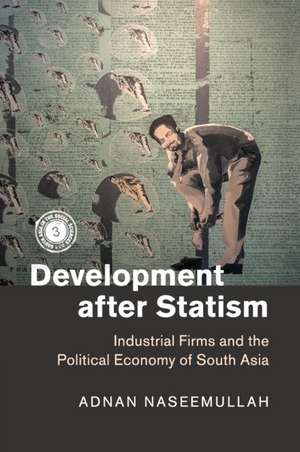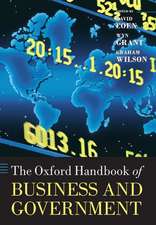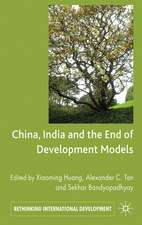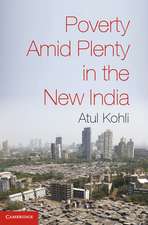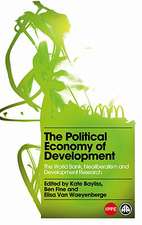Development after Statism: Industrial Firms and the Political Economy of South Asia: South Asia in the Social Sciences
Autor Adnan Naseemullahen Limba Engleză Paperback – 20 feb 2019
| Toate formatele și edițiile | Preț | Express |
|---|---|---|
| Paperback (1) | 288.42 lei 43-57 zile | |
| Cambridge University Press – 20 feb 2019 | 288.42 lei 43-57 zile | |
| Hardback (1) | 698.50 lei 43-57 zile | |
| Cambridge University Press – 14 dec 2016 | 698.50 lei 43-57 zile |
Din seria South Asia in the Social Sciences
-
 Preț: 276.09 lei
Preț: 276.09 lei - 11%
 Preț: 635.84 lei
Preț: 635.84 lei - 11%
 Preț: 583.36 lei
Preț: 583.36 lei -
 Preț: 329.83 lei
Preț: 329.83 lei - 11%
 Preț: 698.50 lei
Preț: 698.50 lei - 8%
 Preț: 528.79 lei
Preț: 528.79 lei - 11%
 Preț: 585.10 lei
Preț: 585.10 lei - 11%
 Preț: 697.62 lei
Preț: 697.62 lei - 9%
 Preț: 627.64 lei
Preț: 627.64 lei - 11%
 Preț: 638.42 lei
Preț: 638.42 lei - 11%
 Preț: 696.80 lei
Preț: 696.80 lei - 11%
 Preț: 606.20 lei
Preț: 606.20 lei - 11%
 Preț: 579.96 lei
Preț: 579.96 lei - 11%
 Preț: 634.99 lei
Preț: 634.99 lei - 14%
 Preț: 843.05 lei
Preț: 843.05 lei - 11%
 Preț: 638.42 lei
Preț: 638.42 lei - 23%
 Preț: 666.61 lei
Preț: 666.61 lei - 20%
 Preț: 550.74 lei
Preț: 550.74 lei - 17%
 Preț: 480.38 lei
Preț: 480.38 lei - 7%
 Preț: 212.92 lei
Preț: 212.92 lei - 16%
 Preț: 481.57 lei
Preț: 481.57 lei
Preț: 288.42 lei
Nou
Puncte Express: 433
Preț estimativ în valută:
55.19€ • 57.78$ • 45.67£
55.19€ • 57.78$ • 45.67£
Carte tipărită la comandă
Livrare economică 07-21 aprilie
Preluare comenzi: 021 569.72.76
Specificații
ISBN-13: 9781316611258
ISBN-10: 1316611256
Pagini: 349
Ilustrații: 15 b/w illus. 15 tables
Dimensiuni: 151 x 228 x 17 mm
Greutate: 0.47 kg
Editura: Cambridge University Press
Colecția Cambridge University Press
Seria South Asia in the Social Sciences
Locul publicării:Cambridge, United Kingdom
ISBN-10: 1316611256
Pagini: 349
Ilustrații: 15 b/w illus. 15 tables
Dimensiuni: 151 x 228 x 17 mm
Greutate: 0.47 kg
Editura: Cambridge University Press
Colecția Cambridge University Press
Seria South Asia in the Social Sciences
Locul publicării:Cambridge, United Kingdom
Cuprins
1. Introduction; 2. Theoretical framework; 3. The rise and fall of India's Statist development; 4. Industrial finance after Statism in India; 5. Labor management after Statism in India; 6. Indian firms and the international economy; 7. The rise and fall of Pakistan's Statist development; 8. Industrialization after Statism in Pakistan; 9. Conclusion; Appendix 1. Statistical models; Appendix 2. List of interviews; References; Index.
Recenzii
'In a political economy framework, no one has probed firm-level manufacturing data in India and Pakistan more meticulously than Adnan Naseemullah. For that reason alone, let alone others, this book stands out and is worth reading.' Ashutosh Varshney, Brown University, Rhode Island
'Deftly combining statistical with ethnographic sources, Adnan Naseemullah has given us a rare comparative view of the merging relations between government and business in India and Pakistan. Should be of interest to scholars, policymakers and commentators.' Partha Chatterjee, Columbia University, New York
'What is the institutional architecture of industrial development in the aftermath of the decline of the state-led industrial development model? Based on a careful analysis of industrialization in India and Pakistan, Adnan Naseemullah provides an original and compelling analysis that puts firms and industrialists as key governance actors shaping the institutional politics of the industrial economy in South Asia and beyond.' Devesh Kapur, University of Pennsylvania
'Deftly combining statistical with ethnographic sources, Adnan Naseemullah has given us a rare comparative view of the merging relations between government and business in India and Pakistan. Should be of interest to scholars, policymakers and commentators.' Partha Chatterjee, Columbia University, New York
'What is the institutional architecture of industrial development in the aftermath of the decline of the state-led industrial development model? Based on a careful analysis of industrialization in India and Pakistan, Adnan Naseemullah provides an original and compelling analysis that puts firms and industrialists as key governance actors shaping the institutional politics of the industrial economy in South Asia and beyond.' Devesh Kapur, University of Pennsylvania
Notă biografică
Descriere
Explores how industrial firms in South Asia manage the challenges of production after government withdrawal from directing industry.
